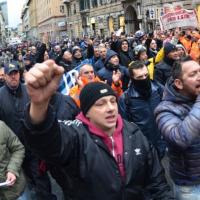
Privatisation of local transport delayed
During five days in November, Genoa in Italy was paralysed by a local strike. Several thousand municipal employees protested against the privatisation of public transport and against austerity.
"In May 2012, a new mayor, Marco Doria, was elected. He was a left candidate, promising to defend the public sector. But instead, he carried out privatisations, and this year he proposed the privatisation of virtually all services", Marco Veruggio from ControCorrente (CWI in Italy) explains. ControCorrente has several members in public transport and other parts of the municipality.
The mayor’s plans included sacking 50 from the City’s Theatre (Carlo Fellici), the privatisation of rubbish collection and public transport (trams, buses, subways and the lifts used on the cliffs surrounding the city) and major cuts.
Members in ControCorrente organised in August a petition for strike action against the proposals. In the department of waste management, a quarter – 410 workers (out of 1600) signed for strike action.
"When the plans were nailed in August, waste disposal workers occupied the town hall and halted the decision. The day after, the police were used against maintenance workers, but the decision was still postponed until September and then November", says Marco.
Now the workers’ response was even stronger.
"800 workers occupied the town hall on November 19. The meeting was postponed again. Wildcat strikes broke out and the city was paralysed for five days."
Dustmen and municipal maintenance workers joined the strikers in public transport. 2,300 employees work for the municipal company AMT.
"The strikers received strong support in Genoa and all over Italy. Metal workers and dock workers, students, taxi drivers and others expressed solidarity. Taxi drivers sent delegates to the striking bus drivers demonstrations."
"The anger was directed against both the municipality and against the union. The union leaders were pressurised to support the strike, but without clear demands and strategy for the strike.

Meanwhile the prefect intervened – the state’s representative in the region – and gave the strikers a fine of 500 to 1,000 euros each.
"After five days the strike was called off and there were negotiations. Many workers complained about the outcome, that the vast privatisation and cuts programme was not stopped completely. Now, privatisation was delayed because the private company that would have taken over pulled out!"
Public transport in Genoa was privatised once before, in 2004. But after that unions were forced to withdraw their support to AMT’s policies, under the pressure of their rank and file in 2011, the council took over again.
"The most important thing with the strike was that it showed the workers’ strength. Declarations of support and actions were orgsnised in other parts of the country. Many in Genoa felt that the strike could become a spark to set the whole of Italy alight." On 5 December bus drivers in Florence followed the example of Genoa and held a 2 day wild-cat strike, stopping the implementation of cuts and redundancies there.
"The five-day battle could also give an inspiration to the city shipyard workers who face a new attempt to privatise their state-owned company."
"ControCorrente was the only political organisation participating in the strike, with members energetically organising the strike itself and the solidarity action. Our posters were everywhere, on doors, buses and even strikers and demonstrators!"

Deep crisis – the struggle increases
- Italy is among the countries hardest hit by the crisis of capitalism since 2007. Industrial production has dropped by 25 percent since then.
- At the same time, the country has not had the same struggles as Greece, Spain or Portugal. One major reason is the crisis of the Left and particularly of Rifondazione Comunista.
- 50,000 people demonstrated against the government and the crisis on 19 October in Rome, organised by the “unions of the base", strikers and social movements. On the day before some effective strikes were organised.

Be the first to comment